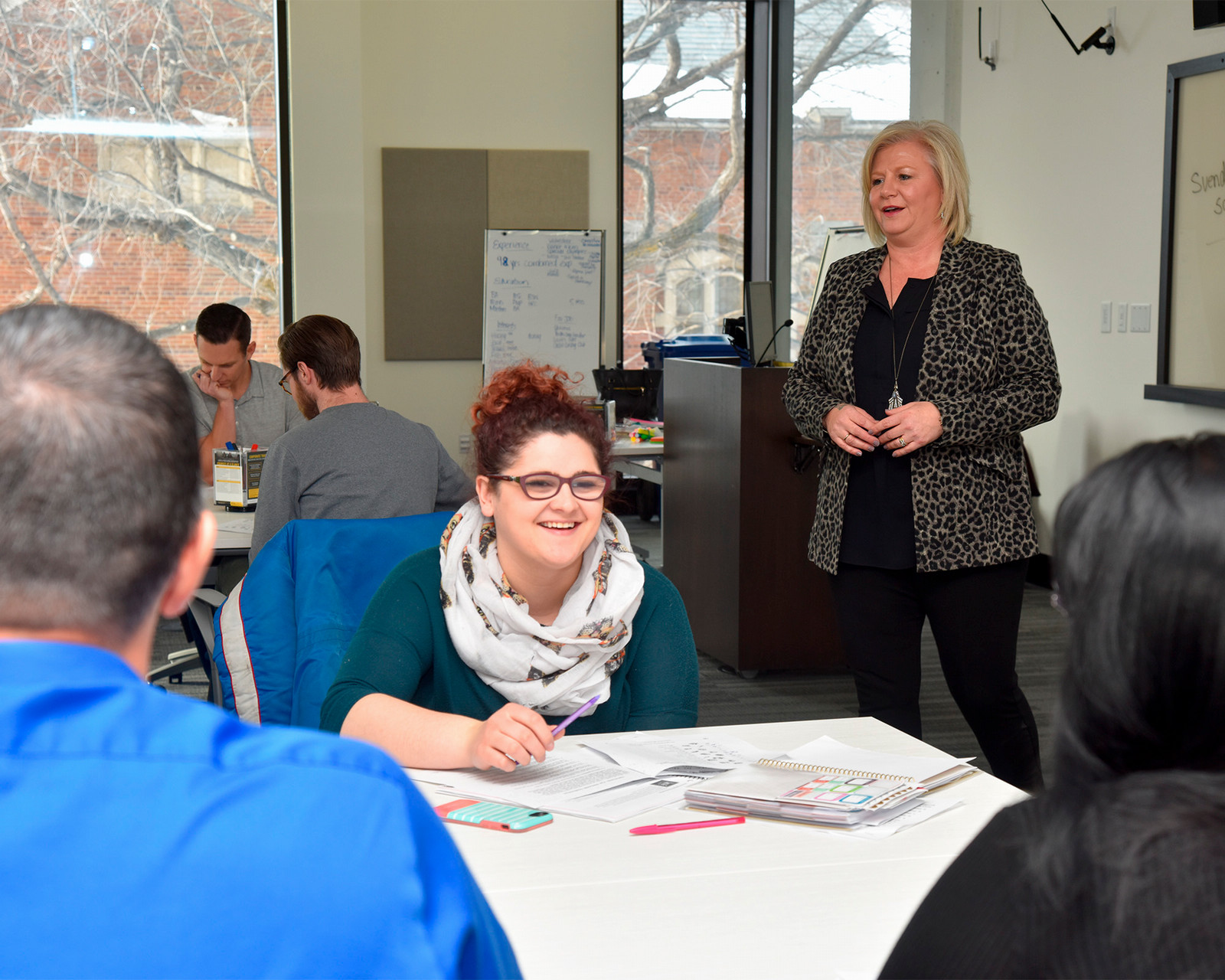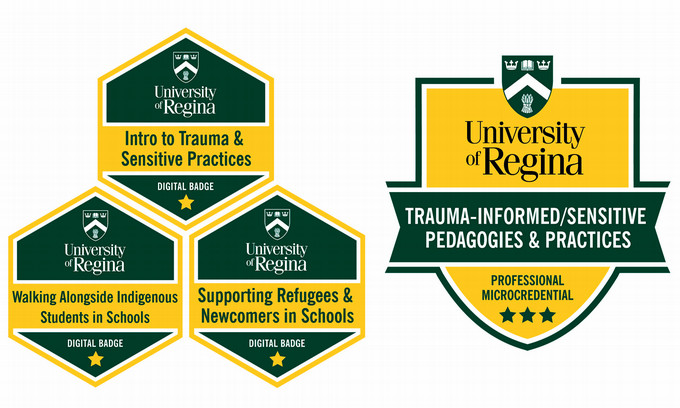
Trauma-Informed/Sensitive Pedagogies and Practices
As an educator, you play a vital role in shaping the learning environment and supporting your students’ well-being. Many children and youth come to school carrying the weight of past and present trauma, which can make learning difficult. Through the Trauma-Informed/Sensitive Pedagogies and Practices Microcertificate, you’ll gain practical tools and strategies to create a safe, inclusive, and supportive classroom. This training empowers you to better understand your students’ needs, strengthen your teaching practice, and help every learner thrive under your care.
Enable Your Students to Thrive
The meaning of trauma has evolved to include the individual experience. Many children and youth are impacted daily by their personal trauma. Teaching students who have been impacted by trauma can be complex. By recognizing this, teachers and those in supportive roles can begin to engage unique practices of working with students and youth who need support and build classroom spaces where all students can thrive.
Responsive and Effective
Trauma-informed/sensitive pedagogies and practices are approaches to teaching and supporting youth that focus on understanding how trauma affects students and aim to help them build resilience. They provide educators with responsive, supportive and useful knowledge and tools to be more effective in complex classrooms or youth environments.
Collaborative Program Development
The Trauma-Informed/Sensitive Pedagogies and Practices Microcertificate program was developed by the University of Regina in partnership with the Saskatchewan Teachers’ Federation Professional Learning and Child Trauma Research Centre. This program is geared towards secondary educators such as teacher, administrator or counselor. You’ll build a wealth of knowledge and skills in areas like:
- Indigenous trauma in urban and rural settings
- Building relationships with both newcomer and local children and youth
- Supporting mental wellbeing for you and those you work with
Creating safe and supportive spaces in schools is critically important. You’ll gain a well-rounded perspective of the trauma your students deal with and equip yourself with a toolkit to help your students thrive at school and in their lives.
Benefits of Trauma-Informed/Sensitive Practices
- Build relationships
- Increase effectiveness
- Understand trauma
- Build resilience
- Build spaces where students thrive
Microcertificate Courses
To complete the Trauma-Informed/Sensitive Pedagogies and Practices Microcertificate, you will need to take 3 of the following 4 courses:
| CODE | Course | Type |
|---|---|---|
| CTRC1 |
Intro to Trauma and Trauma-Informed Sensitive Practices |
Pre-Requisite |
| CTRC2 | Walking Alongside Indigenous Children and Youth in Schools | Required |
| CTRC3 | Supporting Refugee and Newcomer Children Youth and Families | Elective |
| CTRC4 | Creating and Leading Trauma Sensitive Schools | Elective |
All courses are offered either in person over 2 full-days or weekly remote courses (3h/week for 3 weeks).
Professional Microcertificate Trauma-Informed/Sensitive Pedagogies and Practices
QUICK FACTS
Short, skill-based microcredential courses and programs for your professional development with the Centre for Continuing Education.
Connect with us
Digital Credentials
Unique to microcertificates at the U of R, you earn a digital badge with each course you complete. Earn all three badges to earn a digital microcertificate. Share these microcredentials on your resumé or with potential employers online as proof you’ve invested in your educational skills.
Register now for the Trauma-Informed/Sensitive Pedagogies and Practices Microcertificate.
Learn and Hone Trauma-Informed/Sensitive Skills
This program is applicable to every industry. This Professional Microcredential badged courses can help boost your resumé by providing on-the-job skills and competencies. Employers are looking for educators and leaders who can identify and work with children who may have been affected by trauma. Build and hone these skills to meet and exceed expectations!
Highlighted Skills
- Cultural awareness
- Proactive approaches
- Strength-based approaches
- Supporting students
- Understanding trauma
- Two-eye seeing
- Building relationships
I value the many different strategies that were presented and will definitely be using interpretations of them in my school.
Why Study Trauma-Informed/Sensitive Pedagogies and Practices at the University of Regina?
This program has been carefully designed through a partnership with the Saskatchewan Teachers’ Federation Professional Learning and Child Trauma Research Centre. A province-wide facilitator community comprised of Saskatchewan educators developed the program content, working diligently to ensure the program is responsive, culturally relevant, grounded in Indigenous wisdom, supportive, useful and accessible. You’ll have a high-quality learning experience and come away with more confidence and ability to teach and work with trauma-impacted children and youth, and to foster a successful learning environment.
Flexibility
- Take the microcertificate online or in person at the historic and conveniently located College Avenue Campus in Regina.
- Designed to be completed at your own pace, complete the High Impact Leadership Microcertificate in as little as 3 months, or take up to 2 years.
- Each course may be scheduled as in-person or remote.
- Select one course to quickly target a specific skill. Take courses on their own as stand-alone professional development opportunities or combine them and take advantage of carefully curated set of skills.
- Offer a custom learning experience for your own team or organization. Talk to our Business Development Consultant to learn more.
Access Funding
- University of Regina Alumni Association (URAA) Professional Development Award ($500 per term) is available to all U of R alumni, including those who have completed Continuing Education professional certificates or microcertificates.
- Canada Training Credit is a refundable tax credit providing access to $250 each year with unused amounts carried forward to future years for a maximum lifetime amount of $5,000. Find out more about funding.
Qualify for the URAA Professional Development Award – $500 per term!
Industry Expert Instructors
All Centre for Continuing Education professional development instructors are working professionals in their field. They bring real-world expertise to the classroom, ensuring you learn practical skills you can immediately apply in the workplace.Digital, Shareable Credentials
Earn a digital badge for each course in the microcertificate. Earn a digital microcertificate when you complete all three courses. What does this mean? It means you have proof of your investment and your skill development. Using MyCreds, your University of Regina digital credential wallet, you can share your success with those that matter. Share your achievement on LinkedIn and other digital platforms so your boss – or your future boss – can see!
Skills You'll Learn in Trauma-Informed/Sensitive Pedagogies and Practices
The Trauma-Informed/Sensitive Pedagogies and Practices Microcertificate offered by the University of Regina is a specialized program designed to equip educators, administrators, and professionals with the knowledge and skills to support children and youth affected by trauma. By focusing on proactive, strength-based strategies and culturally responsive approaches—especially for Indigenous communities and newcomer families—this microcertificate empowers participants to create inclusive and supportive learning environments.
- Enhance your classroom
- Develop leadership
- Earn industry recognition
- Improve educational outcomes
- Manage conflict
Program Requirements and Credentials
- Courses are offered either remote or in person.
Prequisite
- Intro to Trauma and Trauma-Informed/Sensitive Practices
Required
- Walking Alongside Indigenous Children and Youth in Schools
Electives (Select 1)
- Supporting Refugee and Newcomer Children, Youth and Families
- Creating and Leading Trauma Sensitive Schools
Earn a digital, shareable badge for each course you complete in this microcertificate program. Complete all three courses within two years and earn a digital Professional Microcertificate.
What can I do with a digital credential?
You now have proof of your investment and your skill development. Using MyCreds, your University of Regina digital credential wallet, you can share your success with those that matter. Share your achievement on LinkedIn and other digital platforms so your boss – or your future boss – can see!

Badges
- Get a digital badge with the completion of each course from a Professional Microcertificate
- Get a digital Professional Microcertificate when you complete the required three courses
Your Professional Development Questions Answered
Not sure where to start? Have questions about professional development at the Centre for Continuing Education?
- What is professional development?
- What do I get when I complete CCE professional development programs?
- Can I get funding?
- How am I assessed?
- Do I have to be admitted to the U of R to take CCE professional development?
- Can you help me decide what I should take?
- How are courses delivered?

Instructor Highlight
Dr. Nathalie Reid is the Director of the Child Trauma Research Centre at the University of Regina. Nathalie's career as a Secondary teacher, in three provinces across Canada, often alongside at-risk youth, laid the foundation for her research program (teacher's experiences of/with trauma), and for her desire to think with and inquire into the complexities of children's experiences as well the experiences of those entrusted to care children.
Your Course is Starting! What You Need To Know
UR Community is where you’ll find your program’s online classroom for all courses. Course information like program resources, information from instructors, Zoom links and more will be posted and shared in UR Community.
If you don't already have an account, our Student Services team will create an account for you. Login information will be e-mailed to you before the course starts. Please make sure you can login. If you experience any issues logging in, please contact Student Services.
Login to UR Community.
Location
In-person courses are located in the College Building on the College Avenue Campus at 2155 College Avenue.
Parking
Paid parking is available in the parking lots located on the south side of the College Building. Parking is $2/hour. You can pay to park using the pay stations located in the parking lot and in the main entrance of the College Building or by downloading the PayByPhone app or visiting paybyphone.com. The following information is required to set up an account:
- Mobile phone number
- Credit card (Visa, Mastercard, American Express)
- License plate of vehicle(s)
Refreshments
At our in-person courses, we provide the essentials you need to have a productive learning experience. We provide:
- Lunch, unless otherwise specified
- A selection of coffee, tea and beverages
- Snacks
- Water refill stations
Please enter any dietary requirements when you register online.
Students who withdraw more than 10 business days prior to the course will receive a full refund minus $30 administration fee. If a student registers 10 business days or less prior to the course, they are eligible for a transfer credit only.
Log in to your student account to view the policy and access the withdrawal form.
The University of Regina and the Centre for Continuing Education reserves the right to cancel courses or programs due to insufficient registration or other unforeseen events. If this occurs, participants will be given every opportunity to transfer into another course or refunds will be issued. Decisions regarding withdrawal and/or refunds may be appealed to the Dean, Centre for Continuing Education.
The University is closed on all statutory holidays and between December 24 and January 1.